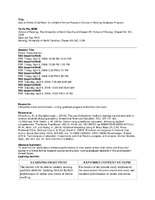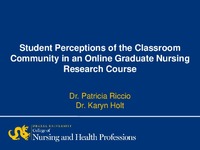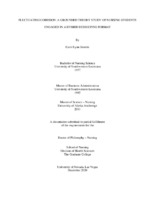| dc.contributor.author | Wu, Ya-Ke | en |
| dc.contributor.author | Yeo, Seon Ae | en |
| dc.date.accessioned | 2016-09-12T20:18:33Z | |
| dc.date.available | 2016-09-12T20:18:33Z | |
| dc.date.issued | 2016-09-12 | |
| dc.identifier.uri | http://hdl.handle.net/10755/620049 | |
| dc.description | <p>Nursing Education Research Conference Theme: Research as a Catalyst for Transformative Practice</p> | en |
| dc.description.abstract | <p><strong>Background: </strong>Online teaching is becoming a norm, though students come to online courses with varying preparations (Distler, 2015). How to create an interactive virtual environment on the Internet for helping student’s preparations of online courses is a challenge (Distler, 2015). Online chat room may have advantages to provide a virtual communication space similar to face-to-face modalities for promoting knowledge learning and helping student’s preparation of tests by online interactive activities (Choudhury & Gouldsborough, 2012).</p>
<p><strong>Objective: </strong>The purpose of this study is to examine the associations between performance of online chat rooms and three online test scores of a hybrid format research course among nursing graduate students in the southeastern United States.</p>
<p><strong>Method: </strong>A nine weeks chat room transcripts of a hybrid format (i.e. 80% online, 20% offline) research course for 60 nursing students in master and doctor of nursing practice programs on a southeastern United States university’s website from August 25, 2015 to November 16, 2015 will be captured. The lectures of the course have been opened online every Tuesday and an online chat room has been opened for one week following lectures of the week in the website. Students earn points for posting a question about the lectures and for answering other student’s questions. In order to enhance the students’ ability of presenting succinct ideas in limited space, a limit for each posting is set as 140 letters and spaces. Reflection online lectures for every week’s chat room result have been uploaded to the website by a faculty of this course in order to provide faculty’s feedbacks.</p>
<p>The students’ performance of chat room in every week and total nine weeks such as number of posting, number of question a student made, number of question a student answered, number of incorrect posting (i.e. incorrect questions or answers), number of posting that exceeding 140 letters with space, and accumulated points for the chat room posting would be computed as independent variables. The scores of three open-book online tests during the semester would be treated as dependent variables.</p>
<p>Descriptive statistics, independent <em>t</em>-test, and Pearson correlation will be performed. Multilevel models will be used to determine the associations between students’ performance of online chat rooms and course test scores (Finch, Bolin, & Kelley, 2014). Age, race, previous experiences of any type of research course and online social media such as twitter and snapchat, number of year between registering this program and the most recent school education program, and attending review sessions of the tests will be adjusted in the models. </p>
<p><strong>Results: </strong>The full score for the first online test was 27 points and the mean of the test score was 23.97 (SD ± 2.44), ranging from 18 to 27 points. The mean chat room posting for six weeks (out of nine weeks for the semester) was 16.82 (SD ± 6.96), ranging from 3 to 49 posting. The mean number of questions a student made for six weeks was 7.23 (SD ±3.03), ranging from 0 to 23 questions. The mean number of question answered for six weeks was 8.20 (SD ±3.60), ranging from 2 to 22 answers. The mean number of incorrect postings for six weeks was 0.35 (SD ±0.61), ranging from 0 to 2 postings. The mean number of total postings that exceeded the limit space for six weeks was 2.70 (SD ±2.28), ranging from 0 to 11 postings. The mean accumulated points for the chat room posting for six weeks was 15.63 (SD ±3.03), ranging from 3 to 18 points.</p>
<p>The score of the first online test was negatively correlated with total number of incorrect posting (<em>r</em>= -.28,<em> p</em>=.03) and total number of posting that exceeded the limit space (<em>r</em>= -.27,<em> p</em>=.03) and positively correlated with total accumulated points for the chat room posting for six weeks (<em>r</em>= .32, <em>p</em>=.01).There was statistical significant difference in first online test score between the students who have and have no incorrect posting in the first six weeks chat rooms (<em>t</em><sub>58</sub> = 2.11, <em>p</em>=.04).</p>
<p>Since currently data collection is still in progress for three more weeks’ chat rooms, the data analyses here only included descriptive statistics, independent <em>t</em>-test, and Pearson correlation for the score of the first online test and the sums of first six weeks’ chat rooms results.</p>
<p><strong>Conclusions:</strong> The results emphasized the associations between incorrect posting, posting that exceeded the limit space, and accumulated points for the chat room posting and course test score. Early identification of students’ learning barriers by their performance of online chat rooms in online teaching may help faculty to recognize the needs of students and to maintain good teaching quality similar to face-to-face campuses.</p> | en |
| dc.format | Text-based Document | en |
| dc.language.iso | en_US | en |
| dc.subject | Interactive Virtual Environment | en |
| dc.subject | Nursing Graduate Program | en |
| dc.subject | Online Chat Room | en |
| dc.title | Use of online chat room for a hybrid format research course in nursing graduate program | en_US |
| dc.type | Poster | en |
| dc.rights.holder | <p>
All rights reserved by the author(s) and/or publisher(s) listed in this item record unless relinquished in whole or part by a rights notation or a Creative Commons License present in this item record.
</p><p>
All permission requests should be directed accordingly and not to the Sigma Repository.
</p><p>
All submitting authors or publishers have affirmed that when using material in their work where they do not own copyright, they have obtained permission of the copyright holder prior to submission and the rights holder has been acknowledged as necessary.
</p> | |
| dc.description.note | <p>Items submitted to a conference/event were evaluated/peer-reviewed at the time of abstract submission to the event. No other peer-review was provided prior to submission to the Henderson Repository, unless otherwise noted.</p> | |
| dc.type.category | Full-text | en |
| dc.evidence.level | N/A | en |
| dc.research.approach | N/A | en |
| dc.contributor.department | Alpha Alpha | en |
| dc.author.details | Ya-Ke Wu, MSN, RN, School of Nursing, The University of North Carolina at Chapel Hill, School of Nursing, Chapel Hill, NC, USA; Seon Ae Yeo, PhD, RNC, FAAN
Nursing, University of North Carolina, Chapel Hill, NC, USA | en |
| dc.conference.name | Nursing Education Research Conference 2016 | en |
| dc.conference.host | Sigma Theta Tau International | en |
| dc.conference.host | National League for Nursing | en |
| dc.conference.location | Washington, DC, USA | en |
| dc.date.conferenceyear | 2016 | |
| dc.contributor.affiliation | The University of North Carolina at Chapel Hill, Chapel Hill, North Carolina, USA | en |
| dc.description.reviewtype | Abstract Review Only: Reviewed by Event Host | en |
| dc.description.acquisition | Proxy-submission | en |






